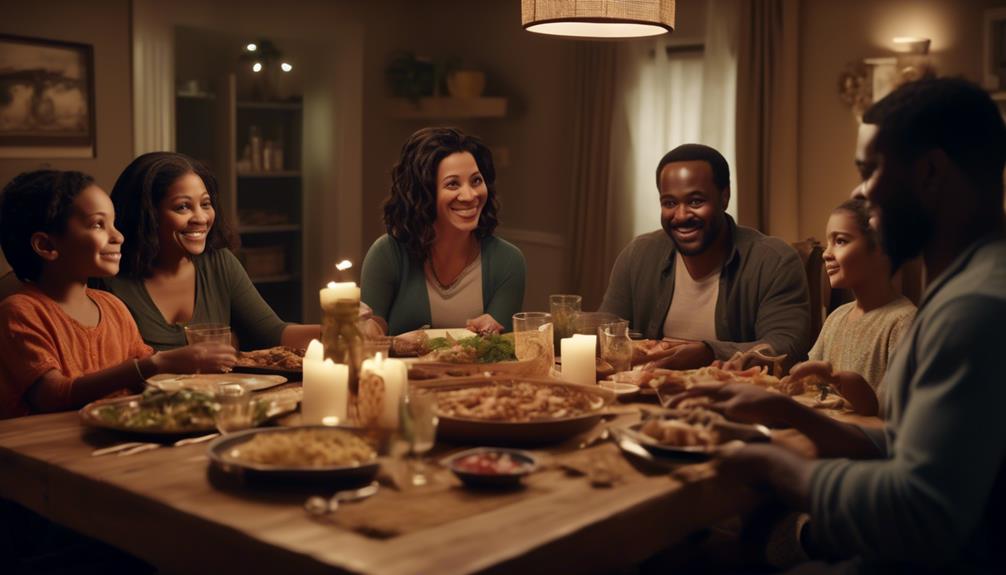What to Do If Your Family Disapproves of Cultural Differences

Step 1: Acknowledge the disapproval: The first step in addressing familial disapproval of cultural differences is to acknowledge that it exists. Recognize that your family may have different beliefs, values, or traditions, and that they might not understand or accept your cultural differences.
Step 2: Educate your family: Once you've acknowledged the disapproval, it's important to educate your family about your culture and its significance to you. Share information, stories, and experiences that help them understand the importance of your cultural identity.
Step 3: Open up a dialogue: Communication is key in resolving any conflict or disagreement. Initiate an open and honest conversation with your family members. Allow them to express their concerns and fears, while also expressing your own feelings and perspectives. This dialogue can help bridge the gap and create a space for understanding.
Step 4: Find common ground: Look for areas of commonality between your culture and your family's beliefs or traditions. Highlight shared values or experiences that can help build a sense of connection and understanding.
Step 5: Seek support: Dealing with familial disapproval can be emotionally challenging. Reach out to friends, mentors, or support groups who have faced similar situations. They can offer guidance, advice, and a listening ear during this process.
Step 6: Be patient and persistent: Changing deeply ingrained beliefs and attitudes takes time. Be patient with your family and the process. Keep having open conversations, sharing your experiences, and showing them that your cultural differences do not change who you are as a person.
Step 7: Set boundaries if necessary: If your family's disapproval becomes toxic or harmful to your well-being, it may be necessary to set boundaries. This could mean limiting contact or seeking professional help to navigate the situation.
Step 8: Focus on self-acceptance: Ultimately, finding resolution with familial disapproval is not solely dependent on changing your family's perspective. It's important to focus on self-acceptance and embracing your cultural identity, regardless of others' opinions. Surround yourself with supportive people who celebrate and appreciate your uniqueness.
Acknowledge and Validate Your Family's Concerns
Acknowledge and validate your family's concerns by actively listening to their perspectives and engaging in open and honest conversations about cultural differences.
Yes, I said it. You need to actually listen to what your family has to say, even if you don't agree with them. It's not about proving them wrong or shutting them down; it's about understanding where they're coming from and empathizing with their fears and worries.
Let's face it – cultural differences can be a challenge for some people. Your family may be worried about how these differences will affect your relationships, your traditions, and your overall sense of identity. And guess what? Their concerns are valid. You can't just dismiss them because you think they're being close-minded or ignorant.
But here's the thing – finding compromises is key. You don't have to completely abandon your cultural values and beliefs, but you also need to respect and honor your family's concerns. It's all about finding that middle ground where both parties feel heard and understood.
Educate Yourself and Your Family About Different Cultures
You need to wake up and realize that your ignorance about different cultures is causing unnecessary tension and conflict within your family.
It's time to educate yourself and your family about different cultures through cultural awareness activities.
Open up a dialogue where you can discuss and understand each other's perspectives, and together, embrace diversity instead of fearing it.
Cultural Awareness Activities
Engage in meaningful cultural activities to expand your understanding and challenge your family's preconceived notions about different cultures. Cultural exchange programs and cultural immersion activities are powerful tools for fostering empathy and breaking down stereotypes. Encourage your family to participate in these activities to gain firsthand experience and develop a deeper appreciation for diverse cultures.
Organize a cultural exchange program within your community, where individuals from different cultural backgrounds can come together and share their traditions, food, and stories. This will help create a sense of unity and understanding among your family members and the community at large.
Additionally, consider participating in cultural immersion activities such as language classes, cooking workshops, or traditional art and music lessons. These experiences will allow you and your family to step outside of your comfort zones and actively engage with different cultural practices. By doing so, you can challenge any preconceived notions and embrace the richness and diversity of our world.
Open Dialogue and Understanding
To truly understand and appreciate different cultures, it's imperative that you and your family actively educate yourselves about them. Ignorance breeds fear and prejudice, and it's our responsibility to challenge these biases.
Here are three ways to promote tolerance and inclusion through open dialogue and understanding:
- Engage in honest conversations: Encourage your family to ask questions and share their concerns openly. Create a safe space where everyone feels heard and respected, even if opinions differ.
- Seek out diverse perspectives: Read books, watch films, and listen to podcasts that explore different cultures and experiences. Expose yourselves to a variety of viewpoints to broaden your understanding and challenge stereotypes.
- Participate in cultural events: Attend festivals, exhibitions, and workshops that celebrate diversity. Embrace the opportunity to learn firsthand from people of different backgrounds and engage in meaningful conversations.
Embrace Diversity Together
To truly foster a culture of acceptance and understanding within your family, it's crucial to actively educate yourselves about different cultures and embrace their diversity. Cultural sensitivity is key in creating an inclusive and harmonious environment at home.
Start by learning about different cultural traditions, customs, and beliefs. Engage in open discussions and encourage questions.
Encourage your family to attend cultural events, festivals, or celebrations, where they can experience firsthand the richness of diversity. Embrace the opportunity to try new foods, listen to different music, and learn new languages.
Encourage your family to build relationships with people from different cultural backgrounds, fostering a deeper understanding and appreciation for their experiences.
Foster Open and Respectful Communication
Foster open and respectful communication by actively listening and addressing family members' concerns about cultural differences head-on. It's essential to create a safe space where everyone's opinions can be heard and respected.
Here are three crucial steps to help you navigate these difficult conversations:
- Validate their concerns: Acknowledge that your family members may have valid worries or fears about cultural differences. Let them know that you understand their perspective and that their feelings are valid.
- Educate and inform: Share information about your culture and its significance. Help your family members understand the value and beauty of your traditions and customs. Encourage them to ask questions and engage in open dialogue.
- Find common ground: Look for shared values and experiences that can bridge the gap between different cultures. Highlight the universal aspects of humanity that connect us all, such as love, kindness, and empathy. Emphasize that cultural differences enrich our lives and promote a more inclusive and diverse society.
Seek Support From Like-Minded Individuals or Support Groups
You need to face the reality that your family may never fully accept or understand your cultural differences.
Seeking support from like-minded individuals or support groups can provide you with a community that understands and validates your experiences.
These networks can offer shared experiences, advice, and a safe space to vent your frustrations and seek guidance on how to navigate the complexities of family disapproval.
Supportive Community Networks
One way to cope with family disapproval of cultural differences is by seeking support from individuals or support groups who share your perspectives and experiences. Building supportive friendships with like-minded individuals can provide you with a safe space to express yourself and receive validation for your cultural identity.
Support groups specifically focused on cultural exchange programs can offer a sense of community and understanding, as they bring together individuals who've faced similar challenges and triumphs. These networks can provide emotional support, practical advice, and resources to help you navigate the complexities of family disapproval.
When facing family disapproval of cultural differences, connecting with individuals or support groups who share your perspectives and experiences can be a powerful source of shared experiences and advice. Seeking support from like-minded individuals or joining support groups allows you to navigate cultural differences with the guidance of those who understand your struggles firsthand.
These individuals or groups can provide a safe space where you can openly discuss your challenges and find solace in knowing that you aren't alone. By surrounding yourself with people who value cultural sensitivity, you can gain valuable insights and strategies on how to handle family disapproval.
These shared experiences and advice can empower you to stand firm in your beliefs, while also fostering understanding and acceptance within your family. Remember, seeking support from like-minded individuals or support groups is a crucial step in overcoming cultural differences and building a more inclusive environment within your family.
Finding common ground and celebrating shared values is crucial in navigating family disapproval of cultural differences. It may not be easy, but it's necessary if you want to bridge the gap and create understanding within your family.
Here are three ways to do it:
- Acknowledge the similarities: While your cultures may be different, there are likely some core values that you all hold dear. Focus on those shared values and highlight how they align with your own cultural background. By finding commonalities, you can create a sense of unity that transcends cultural differences.
- Educate and inform: Sometimes, family members disapprove of cultural differences simply because they don't understand them. Take the initiative to educate and inform your family about your culture. Share stories, traditions, and history to help them gain a deeper understanding. Knowledge has the power to dissolve ignorance and foster acceptance.
- Celebrate together: Organize family gatherings or events where you can showcase elements of your culture. Whether it's through food, music, or traditional clothing, sharing these experiences can help your family see the beauty and richness of your cultural heritage. Celebrating together can create lasting memories and strengthen familial bonds.
Set Boundaries and Establish a Safe Space for Cultural Expression
To effectively navigate family disapproval of cultural differences, it's essential to establish clear boundaries and create a safe space for cultural expression.
It's time to put your foot down and assert your right to embrace and celebrate your cultural identity. Your family may not understand or agree with your choices, but it's important to establish boundaries that protect your cultural expression.
Start by having an open and honest conversation with your family about your desire to express your cultural identity. Clearly communicate your expectations and boundaries, making it known that cultural expression is non-negotiable. Explain that this is an essential part of who you are, and it deserves respect and acceptance.
In order to promote cultural expression within the family, it's crucial to create a safe space where you can freely express yourself without fear of judgment or ridicule. This may involve setting ground rules for discussions, prohibiting derogatory comments or stereotypes, and actively challenging any discriminatory behavior.
Lead by Example and Demonstrate the Benefits of Cultural Diversity
Take charge and show your family the power and benefits of embracing cultural diversity through leading by example. It's time to step up and be a role model for promoting inclusivity within your family. Here are three compelling reasons why leading by example is crucial in demonstrating the benefits of cultural diversity:
- Foster empathy: By embracing different cultures and showcasing acceptance, you teach your family the value of empathy. They'll learn to understand and respect the experiences and perspectives of others, leading to a more compassionate and inclusive environment.
- Expand horizons: Exposing your family to different cultures broadens their worldview. It challenges their preconceived notions and allows them to see the beauty and richness in diversity. By encouraging exploration and learning, you empower them to embrace new ideas and experiences.
- Create harmony: Cultural diversity brings people together, fostering unity and harmony. By promoting inclusivity within your family, you set the stage for peaceful coexistence, where everyone is valued for their unique contributions. This not only strengthens familial bonds but also creates a supportive environment for personal growth.
Consider Seeking Professional Help or Mediation if Conflicts Persist
If conflicts persist despite your efforts to address family disapproval of cultural differences, it may be necessary to consider seeking professional help or mediation. Seeking professional guidance can be a valuable resource for resolving conflicts effectively and finding a way forward. Sometimes, the issues at hand are deep-rooted and require the expertise of a trained professional who can provide an unbiased perspective.
In such situations, mediation can also be a useful tool. Mediators are trained to facilitate open and honest communication between parties, helping to identify common ground and find mutually acceptable solutions. They can guide the conversation and promote understanding, allowing each family member to express their concerns and viewpoints in a safe and respectful environment.
To give you a better idea of the benefits of seeking professional help or mediation, here is a table that highlights some key advantages:
| Seeking Professional Help | Mediation |
|---|---|
| Provides expert guidance | Facilitates open communication |
| Offers an unbiased perspective | Promotes understanding |
| Helps identify underlying issues | Guides the conversation |
| Assists in finding solutions | Creates a safe environment for dialogue |
Frequently Asked Questions
How Can I Convince My Family to Accept and Embrace Cultural Differences?
Convincing your family to accept and embrace cultural differences requires open conversations, empathy, and education. Show them the beauty and richness of diverse cultures, challenge their preconceived notions, and emphasize the importance of inclusivity and respect.
What if My Family Refuses to Educate Themselves About Different Cultures?
If your family refuses to educate themselves about different cultures, it can be challenging. However, you must navigate this disapproval by emphasizing the importance of diversity and the positive impact it can have on relationships.
Are There Any Resources Available to Help Me Find Support From Like-Minded Individuals or Support Groups?
Finding support from like-minded individuals or support groups can be crucial when dealing with family disapproval of cultural differences. There are resources available online and in your community to help you cope and find understanding.
Finding common ground with your family and celebrating shared values despite cultural differences can be challenging. However, fostering understanding is crucial. Start by engaging in open and honest conversations, actively listening, and seeking compromises that respect everyone's beliefs.
When Should I Consider Seeking Professional Help or Mediation to Resolve Conflicts Related to Cultural Differences Within My Family?
When your family disapproves of cultural differences, seeking therapy or family counseling may be necessary. These professionals can help mediate conflicts and provide guidance on how to navigate the challenges within your family.











